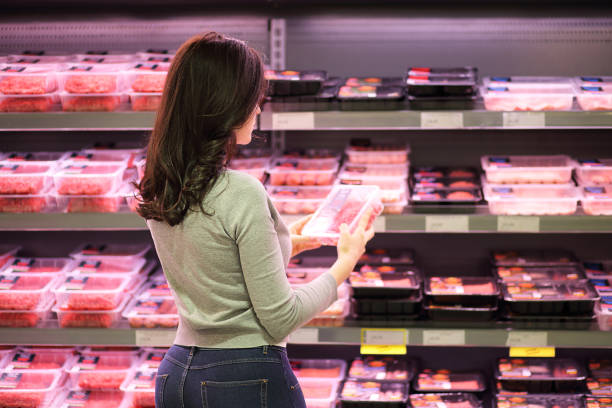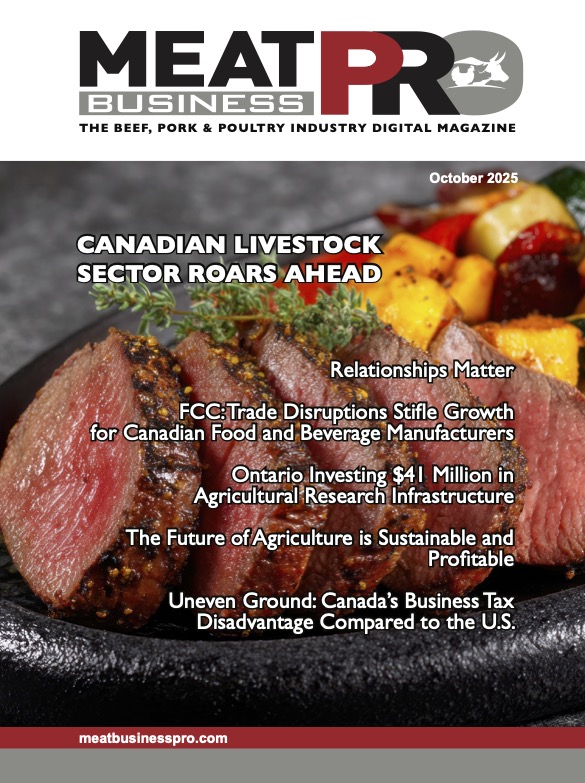Food Inflation In Canada: What You Need To Know

The question on every Canadian’s mind lately: Why are grocery prices still so high?
by Courtney Reilly-Larke & Fiona Campbell – Forbes Canada
Granted, the price growth for food is finally starting to slow, coming in at 3.4% year-over-year in January compared to 4.7% in December, according to the most recent Consumer Price Index (CPI) .
Statistics Canada characterized the slowdown as broad-based, with meat, dairy, bakery products and fresh fruit contributing the most to the deceleration, with other foods, such as soup, bacon and shrimp/prawns fostering a year-over-year price decline. However, prices are still uncomfortably high.
Still, there is some good news: according to the most recent edition of Canada’s Food Report, published by Dalhousie University, the University of Guelph, the University of Saskatchewan and the University of British Columbia, food prices in 2024 are predicted to rise by 2.5% to 4.5%, compared to between 5% and 7% in 2023. The average family of four is expected to spend $16,297.20 on food in 2024, an increase of up to $701.79 from last year, compared to an increase of $1,065 in 2023.
Notes Andrea Rankin, research associate at the Agri-Food Analytics Labs at Dalhousie: “Canadians can anticipate possibly calmer food prices through the coming year.”
“The most recent CPI numbers are promising, but high food prices mean that Canadians are decreasing both the quantity and quality of food they are buying”There are many complex contributing factors to food inflation—extreme weather events, global supply chain issues, geopolitical instability, high energy costs and a weak Canadian dollar compared to the U.S.—that are impossible to control. However, grocery store pricing is under the purview of individual retailers. To this end, in early 2023, members of Parliament took Canadian grocers to task on inflated food prices and record-high profits. We take a look back at the outcomes of the parliamentary hearing and what it could mean for the future of your grocery bill.
What Happened at the Parliamentary Committee?
On March 8, 2023, the heads of Loblaw, Metro and Empire (the parent company of Sobeys, Safeway, IGA, Foodland, FreshCo, Farm Boy and Longos) appeared before a parliamentary committee, largely to defend themselves against accusations of profit-mongering.
At that time, grocery prices had risen to their highest level in decades. As of February 2023, grocery prices rose 10.6% year-over-year, more than double the then overall inflation rate of 5.2%. Meanwhile, corporate profits had risen—and major Canadian grocery chains were boasting very high profits.
Some Canadians referred to the phenomenon colloquially as “greedflation”—accusing the grocers of taking advantage of the inflationary climate to earn excess profits at the expense of cash-strapped consumers with limited choices.
According to a 2022 report by the Agri-Food Analytics Lab at Dalhousie University, all three of the leading Canadian grocery corporations posted higher profits in the first half of the year than their average performance over the past five years. In particular, Loblaw’s gross profit in the first half of 2022 surpassed its previous record by $180 million, earning the equivalent of an extra $1 million per day.
While a number of factors have been cited as the cause of this increase in price—from supply chain issues to the Carbon Tax—a major factor many suspect is greed among food retailers.
This is why federal politicians like Finance Minister Chrystia Freeland and NDP Leader Jagmeet Singh asked the heads of Canada’s grocery industry to provide insight into what is driving prices up.
What Did Canada’s Grocery Executives Say about Food Inflation?
The CEOs and presidents of grocery chains including Loblaw, Metro and Empire spoke to the Standing Committee on Agriculture and Agri-Food. The grocers denied the allegations of “greedflation,” insisting that the high grocery prices are not caused by profit-mongering and that their margins on food products have remained thin.
“The truth is we are at the end of a very long food supply chain that has economic inputs at every step and stage,” said Michael Medline, the president and CEO of Empire.
Galen Weston Jr., president of Loblaw, also refuted accusations of profit-mongering, saying that grocery profit margins remain small, at about 4%.
“That means even if the industry had zero profits, a $25 grocery bill would still cost $24,” said Weston, so consumers still wouldn’t save much at the grocery till. He attributes the company’s larger profits to its other offerings that make up over half of its business, like financial services and clothing. He also said that the company pushed back against $500 million in unjustified cost increases from suppliers.
In a report titled The Truth About Canadian Grocery Inflation, the Retail Council of Canada (RCC) supports these refutations, stating that “Grocer earnings of around 3.5% on average are among the lowest among Canadian industries and are eclipsed by those of most of the food manufacturers.” What’s more, grocery profits are driven by items in health, beauty and pharmacy, notes the RCC, and food profits are reportedly “flat.”
Further Transparency Going Forward
The grocery leaders were asked whether they would commit to providing further transparency in the future. This would involve sharing detailed financial statements with the Competition Bureau, which had been studying whether a lack of competition in the grocery industry could be contributing to the uptick in prices .
The bureau delivered its market study report in June 2023. Titled Canada Needs More Grocery Competition, it calls on all levels of government to increase competition in the grocery industry, by creating a “whole-of-government strategy” to support new grocery businesses that would encourage the growth of independent grocers and the entry of international grocers, limit the use of property controls that act as barriers to new entrants, and introduce transparent harmonized unit pricing requirements .
For their part, the grocery magnates said they were already sharing their financial statements and Medline voiced his support for a new grocery code of conduct that the federal government proposed.
What is the Grocery Code of Conduct and How Will It Affect Canadians?
The Grocery Code of Conduct would aim to foster a more fair and transparent relationship between retailers and producers.
Efforts to develop a code started in fall 2021 and in January 2023, Marie-Claude Bibeau, then Minister of Agriculture and Agri-Food, and industry leaders met to discuss the final details of the plan.
The code would put in place rules that some industry players believe would help smaller stores and to make Canada more attractive to suppliers—increasing competition in the food industry.
Currently, if big chains ask for an increase in the supply of a product, or even all of it, and the supplier doesn’t comply, there’s a fee or fine imposed. This strategy has left smaller stores with little to no supply by comparison.
These hidden costs, along with the fees suppliers must pay retailers to have their products displayed, to purchase shelf space and other unexpected fees, has driven some suppliers away from the Canadian market.
Putting the code in place could result in more suppliers distributing in Canada, which could be good news for consumers. The logic being that more suppliers and competition between them would result in slight price decreases. Plus, it would be a win for small businesses. Australia and the U.K., for example, have similar codes in place.
However, in November 2023 it was reported that Loblaw Companies Ltd. pushed back against the code, raising concerns that it would only fuel food inflation more, and “raise food prices for Canadians by more than $1 billion.” Walmart Canada has also reportedly expressed cost concerns over the code and Costco, when asked if the company would participate in a code, was quoted as saying that the company already has a productive relationship with suppliers, though would participate “if the goal is to reduce costs for consumers.”
A finalized version of the code was presented to federal, provincial and territorial ministers in late 2023. In January 2024, the interim board of directors of the Office of the Adjudicator for the Grocery Code of Conduct reported that “there have been concerns about potential market imbalances if not all key players participate.” There is currently no timeline for implementation.
Why Were the Leaders of Costco and Walmart Absent?
All that said, some of the retailers asked a valid question: Why were large American companies that operate in Canada excluded from the parliamentary committee’s study into food inflation? During the hearing, both Medline and Eric La Flèche, the president and CEO of Metro, questioned why the committee’s MPs seemed to exclude Walmart and Costco from their study meant to get a clearer picture of Canada’s food system. The committee subsequently approved a motion to invite Horacio Barbeito, the president and CEO of Walmart Canada, and Pierre Riel, the executive VP and COO of Costco Wholesale Canada.
Gonzalo Gebara, the new president and CEO of Walmart Canada as of January 2023, told the parliamentary committee in late March 2023 that the company was not trying to profit from food inflation, but instead maintain a price gap between its products and those sold by competitors.
In April 2023, Riel appeared before the House of Commons and echoed messages already conveyed by other grocers that retailers are not solely responsible for food inflation and that there are stressors across the supply chain. Riel told the committee that 58.5% of Costco’s total pretax profits comes from membership fees.
Bottom line
Most Canadians simply want to know when food prices will start to go down. The most recent CPI numbers are promising, but high food prices mean that Canadians are decreasing both the quantity and quality of food they are buying. The pledges for further transparency from major retailers could help along with more scrutiny from Canada’s Competition Bureau. In the meantime, whether it’s shopping at the cheapest store you can find, using a grocery credit card or couponing, there are still many ways you can combat inflation and try to save money at the register.











